
- Android实现九宫格(GridView中各项平分空间)的方法
- Grow heap (frag case) 堆内存过大的深入解析
- 解析android中include标签的使用
- Android中通过AsyncTask类来制作炫酷进度条的实例教程
- Android中使用include标签和merge标签重复使用布局
- android 网络编程之网络通信几种方式实例分享
- Android开发学习笔记之通过API接口将LaTex数学函数表达式转化为图片形式
- Android开发之利用jsoup解析HTML页面的方法
- Android判断touch事件点是否在view范围内的方法
- Android控件之ListView用法实例详解
- Android编程获取网络连接方式及判断手机卡所属运营商的方法
- Android三种菜单实例分析
- android实现上下滚动的TextView
- [Android开发从零开始].6.DDMS视图和Button
- Android简单实现启动画面的方法
- android:descendantFocusability方法介绍
- Android判断现在所处界面是否为home主桌面的方法
- android 自定义Android菜单背景的代码
- Android开发之ListView实现Item局部刷新
- Android中自定义进度条详解
- Android拍照或从图库选择图片并裁剪
- android获取手机IMSI码判断手机运营商代码实例
- Android客户端软件开发_6、软件的架构、设计模式、代码管理
- Android监听来电和去电的实现方法
- Android性能优化以及数据优化方法
- Android中让图片自适应控件的大小的方法
- Android HttpURLConnection.getResponseCode()错误解决方法
- Android中资源文件用法简单示例
- Android编程实现基于局域网udp广播自动建立socket连接的方法
- Android实现listview动态加载数据分页的两种方法
Android 吸入动画效果实现分解
作者:佚名 Android开发编辑:admin 更新时间:2022-07-23
Android 吸入动画效果详解 .
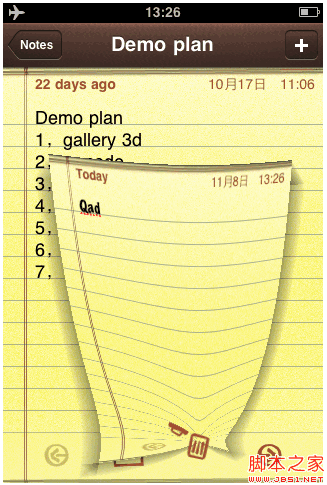
这里,我要介绍的是如何在Android上面实现一个类似的效果。先看看我实现的效果图。
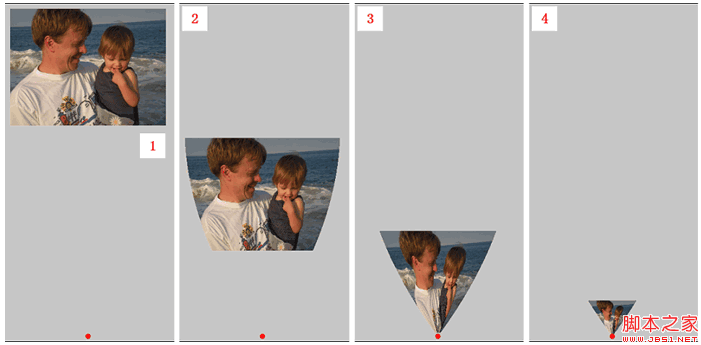
上图演示了动画的某几帧,其中从1 - 4,演示了图片从原始图形吸入到一个点(红色标识)。
实现这样的效果,我们利用了Canvas.drawBitmapMesh()方法,这里涉及到了一个Mesh的概念。
2,Mesh的概念
Mesh表示网格,说得通俗一点,可以将画板想像成一张格子布,在这个张布上绘制图片。对于一个网格端点均匀分布的网格来说,横向有meshWidth + 1个顶点,纵向有meshHeight + 1个端点。顶点数据verts是以行优先的数组(二维数组以一维数组表示,先行后列)。网格可以不均匀分布。请看下图所示:
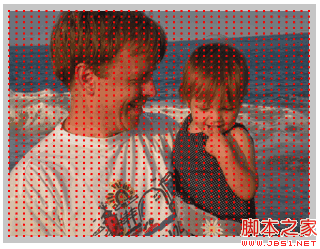
上图中显示了把图片分成很多格子,上图中的每个格子是均匀的,它的顶点数是:(meshWidth + 1) * (meshHeight + 1)个,那么放这些顶点的一维数据的大小应该是:(meshWidth + 1) * (meshHeight + 1) * 2 (一个点包含x, y坐标)
复制代码 代码如下:
float[] vertices = new float[:(meshWidth + 1) * (meshHeight + 1) * 2];
试想,我们让这个格子(mesh)不均匀分布,那么绘制出来的图片就会变形,请看下图所示:
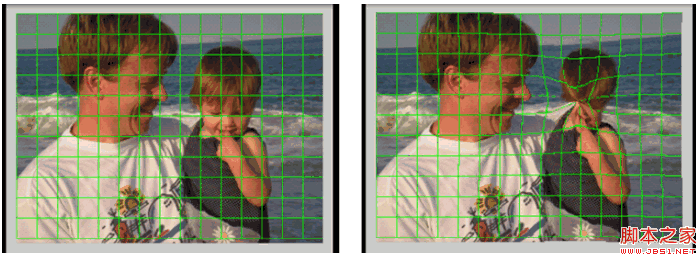
3,如何构建Mesh
吸入动画的核心是吸入到一个点,那么我们就是要在不同的时刻构造出不同的mesh的顶点坐标,我们是怎么做的呢?
3.1,创建两条路径(Path)
假如我们的吸入效果是从上到下吸入,我们构造的Path是如下图所示:
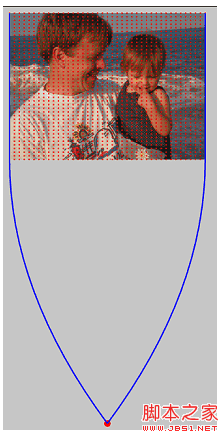
上图中蓝色的线表示我们构造的Path,其实只要我们沿着这两条Path来构造mesh顶点就可以了。
构建两条Path的代码如下:
复制代码 代码如下:
mFirstPathMeasure.setPath(mFirstPath, false);
mSecondPathMeasure.setPath(mSecondPath, false);
float w = mBmpWidth;
float h = mBmpHeight;
mFirstPath.reset();
mSecondPath.reset();
mFirstPath.moveTo(0, 0);
mSecondPath.moveTo(w, 0);
mFirstPath.lineTo(0, h);
mSecondPath.lineTo(w, h);
mFirstPath.quadTo(0, (endY + h) / 2, endX, endY);
mSecondPath.quadTo(w, (endY + h) / 2, endX, endY);
3.2,根据Path来计算顶点坐标
算法:
1,假如我们把格子分为WIDTH, HEIGHT份,把Path的长度分的20份,[0, length],表示20个时刻。
2,第0时间,我们要的形状是一个矩形,第1时刻可能是梯形,第n时间可能是一个三角形。下图说明了动画过程中图片的变化。
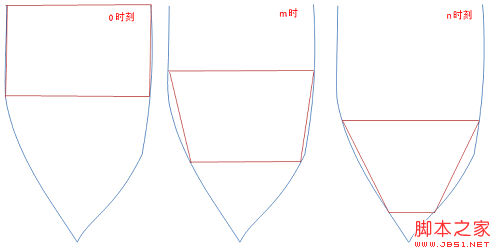
3,第一条(左)Path的长度为len1,第二条(右)Path的长度为len2,对于任意时刻 t [0 - 20],我们可以知道梯形的四个顶点距Path最顶端的length。
左上角:t * (len1 / 20)
左下角:t * (len1 / 20) + bitmapHeight
右上角:t * (len2 / 20)
右下角:t * (len2 / 20) + bitmapHeight
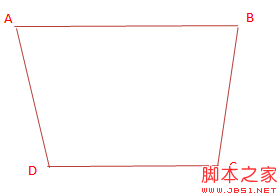
我们可以通过PathMeasure类根据length算出在Path上面点的坐标,也就是说,根据两条Path,我们可以分别算了四个顶点的坐标,我这里分别叫做A, B, C, D(顺时针方向),有了点的坐标,我们可以算出AD,BC的长度,并且将基进行HEIGHT等分(因为我们把mesh分成宽WIDTH,高HEIGHT等分),将AD,BC上面每等分的点连接起来形成一条直接,将再这条直接水平WIDTH等分,根据直线方程,依据x算出y,从而算出每一个顶点的坐标。(请参考上图)
下面是计算顶点坐标的详细代码:
复制代码 代码如下:
private void buildMeshByPathOnVertical(int timeIndex)
{
mFirstPathMeasure.setPath(mFirstPath, false);
mSecondPathMeasure.setPath(mSecondPath, false);
int index = 0;
float[] pos1 = {0.0f, 0.0f};
float[] pos2 = {0.0f, 0.0f};
float firstLen = mFirstPathMeasure.getLength();
float secondLen = mSecondPathMeasure.getLength();
float len1 = firstLen / HEIGHT;
float len2 = secondLen / HEIGHT;
float firstPointDist = timeIndex * len1;
float secondPointDist = timeIndex * len2;
float height = mBmpHeight;
mFirstPathMeasure.getPosTan(firstPointDist, pos1, null);
mFirstPathMeasure.getPosTan(firstPointDist + height, pos2, null);
float x1 = pos1[0];
float x2 = pos2[0];
float y1 = pos1[1];
float y2 = pos2[1];
float FIRST_DIST = (float)Math.sqrt( (x1 - x2) * (x1 - x2) + (y1 - y2) * (y1 - y2) );
float FIRST_H = FIRST_DIST / HEIGHT;
mSecondPathMeasure.getPosTan(secondPointDist, pos1, null);
mSecondPathMeasure.getPosTan(secondPointDist + height, pos2, null);
x1 = pos1[0];
x2 = pos2[0];
y1 = pos1[1];
y2 = pos2[1];
float SECOND_DIST = (float)Math.sqrt( (x1 - x2) * (x1 - x2) + (y1 - y2) * (y1 - y2) );
float SECOND_H = SECOND_DIST / HEIGHT;
for (int y = 0; y <= HEIGHT; ++y)
{
mFirstPathMeasure.getPosTan(y * FIRST_H + firstPointDist, pos1, null);
mSecondPathMeasure.getPosTan(y * SECOND_H + secondPointDist, pos2, null);
float w = pos2[0] - pos1[0];
float fx1 = pos1[0];
float fx2 = pos2[0];
float fy1 = pos1[1];
float fy2 = pos2[1];
float dy = fy2 - fy1;
float dx = fx2 - fx1;
for (int x = 0; x <= WIDTH; ++x)
{
// y = x * dy / dx
float fx = x * w / WIDTH;
float fy = fx * dy / dx;
mVerts[index * 2 + 0] = fx + fx1;
mVerts[index * 2 + 1] = fy + fy1;
index += 1;
}
}
}
4,如何绘制
绘制代码很简单,调用Canvas.drawBitmapMesh方法。最本质是要计算出一个顶点数组。
复制代码 代码如下:
canvas.drawBitmapMesh(mBitmap,
mInhaleMesh.getWidth(),
mInhaleMesh.getHeight(),
mInhaleMesh.getVertices(),
0, null, 0, mPaint);
5,如何实现动画
复制代码 代码如下:
protected void applyTransformation(float interpolatedTime, Transformation t)
{
int curIndex = 0;
Interpolator interpolator = this.getInterpolator();
if (null != interpolator)
{
float value = interpolator.getInterpolation(interpolatedTime);
interpolatedTime = value;
}
if (mReverse)
{
interpolatedTime = 1.0f - interpolatedTime;
}
curIndex = (int)(mFromIndex + (mEndIndex - mFromIndex) * interpolatedTime);
if (null != mListener)
{
mListener.onAnimUpdate(curIndex);
}
}
在动画里面,我们计算出要做动画的帧的index,假设我们把吸入动画分为20帧,在动画里面,计算出每一帧,最后通过onAnimUpdate(int index)方法回调,在这个方法实现里面,我们根据帧的index来重新计算一个新的mesh顶点数组,再用这个数组来绘制bitmap。这样,我们就可以看来一组连续变化的mesh,也就能看到吸扩效果的动画。
动画类里面,最核心就是扩展Animation类,重写applyTransformation方法。
6,总结
本文简单介绍了吸放效果的实现,根据这个原理,我们可以构造更加复杂的Path来做更多的效果。同时,也能实现向上,向左,向右的吸入效果。
最本质是我们要理解Mesh的概念,最核心的工作就是构造出Mesh的顶点坐标。
计算Mesh通常是一个很复杂的工作,作一些简单的变形还可以,对于太复杂的变形,可能还是不太方便。另外,像书籍翻页的效果,用mesh其实也是可以做到的。只是算法复杂一点。
这里不能给出完整的代码,原理可能不是说得太清楚,但愿给想实现的人一个思路指引吧。
7,实现代码
InhaleAnimationActivity.java
复制代码 代码如下:
package com.nj1s.lib.test.anim;
import android.os.Bundle;
import android.view.Gravity;
import android.view.Menu;
import android.view.MenuItem;
import android.view.View;
import android.widget.Button;
import android.widget.LinearLayout;
import com.nj1s.lib.mesh.InhaleMesh.InhaleDir;
import com.nj1s.lib.test.GABaseActivity;
import com.nj1s.lib.test.R;
import com.nj1s.lib.test.effect.BitmapMesh;
public class InhaleAnimationActivity extends GABaseActivity
{
private static final boolean DEBUG_MODE = false;
private BitmapMesh.SampleView mSampleView = null;
@Override
protected void onCreate(Bundle savedInstanceState)
{
super.onCreate(savedInstanceState);
LinearLayout linearLayout = new LinearLayout(this);
mSampleView = new BitmapMesh.SampleView(this);
mSampleView.setIsDebug(DEBUG_MODE);
mSampleView.setLayoutParams(new LinearLayout.LayoutParams(-1, -1));
Button btn = new Button(this);
btn.setText("Run");
btn.setTextSize(20.0f);
btn.setLayoutParams(new LinearLayout.LayoutParams(150, -2));
btn.setOnClickListener(new View.OnClickListener()
{
boolean mReverse = false;
@Override
public void onClick(View v)
{
if (mSampleView.startAnimation(mReverse))
{
mReverse = !mReverse;
}
}
});
linearLayout.setOrientation(LinearLayout.VERTICAL);
linearLayout.setGravity(Gravity.CENTER_VERTICAL);
linearLayout.addView(btn);
linearLayout.addView(mSampleView);
setContentView(linearLayout);
}
@Override
public boolean onCreateOptionsMenu(Menu menu)
{
getMenuInflater().inflate(R.menu.inhale_anim_menu, menu);
return true;
}
@Override
public boolean onOptionsItemSelected(MenuItem item)
{
switch(item.getItemId())
{
case R.id.menu_inhale_down:
mSampleView.setInhaleDir(InhaleDir.DOWN);
break;
case R.id.menu_inhale_up:
mSampleView.setInhaleDir(InhaleDir.UP);
break;
case R.id.menu_inhale_left:
mSampleView.setInhaleDir(InhaleDir.LEFT);
break;
case R.id.menu_inhale_right:
mSampleView.setInhaleDir(InhaleDir.RIGHT);
break;
}
return super.onOptionsItemSelected(item);
}
}
BitmapMesh.java
复制代码 代码如下:
/*
* Copyright (C) 2008 The Android Open Source Project
*
* Licensed under the Apache License, Version 2.0 (the "License");
* you may not use this file except in compliance with the License.
* You may obtain a copy of the License at
*
* http://www.apache.org/licenses/LICENSE-2.0
*
* Unless required by applicable law or agreed to in writing, software
* distributed under the License is distributed on an "AS IS" BASIS,
* WITHOUT WARRANTIES OR CONDITIONS OF ANY KIND, either express or implied.
* See the License for the specific language governing permissions and
* limitations under the License.
*/
package com.nj1s.lib.test.effect;
import android.content.Context;
import android.graphics.Bitmap;
import android.graphics.BitmapFactory;
import android.graphics.Canvas;
import android.graphics.Color;
import android.graphics.Matrix;
import android.graphics.Paint;
import android.graphics.Paint.Style;
import android.graphics.Path;
import android.util.Log;
import android.view.MotionEvent;
import android.view.View;
import android.view.animation.Animation;
import android.view.animation.Interpolator;
import android.view.animation.Transformation;
import com.nj1s.lib.mesh.InhaleMesh;
import com.nj1s.lib.mesh.InhaleMesh.InhaleDir;
import com.nj1s.lib.test.R;
public class BitmapMesh {
public static class SampleView extends View {
private static final int WIDTH = 40;
private static final int HEIGHT = 40;
private final Bitmap mBitmap;
private final Matrix mMatrix = new Matrix();
private final Matrix mInverse = new Matrix();
private boolean mIsDebug = false;
private Paint mPaint = new Paint();
private float[] mInhalePt = new float[] {0, 0};
private InhaleMesh mInhaleMesh = null;
public SampleView(Context context) {
super(context);
setFocusable(true);
mBitmap = BitmapFactory.decodeResource(getResources(),
R.drawable.beach);
mInhaleMesh = new InhaleMesh(WIDTH, HEIGHT);
mInhaleMesh.setBitmapSize(mBitmap.getWidth(), mBitmap.getHeight());
mInhaleMesh.setInhaleDir(InhaleDir.DOWN);
}
public void setIsDebug(boolean isDebug)
{
mIsDebug = isDebug;
}
public void setInhaleDir(InhaleMesh.InhaleDir dir)
{
mInhaleMesh.setInhaleDir(dir);
float w = mBitmap.getWidth();
float h = mBitmap.getHeight();
float endX = 0;
float endY = 0;
float dx = 10;
float dy = 10;
mMatrix.reset();
switch (dir)
{
case DOWN:
endX = w / 2;
endY = getHeight() - 20;
break;
case UP:
dy = getHeight() - h - 20;
endX = w / 2;
endY = -dy + 10;
break;
case LEFT:
dx = getWidth() - w - 20;
endX = -dx + 10;
endY = h / 2;
break;
case RIGHT:
endX = getWidth() - 20;
endY = h / 2;
break;
}
mMatrix.setTranslate(dx, dy);
mMatrix.invert(mInverse);
buildPaths(endX, endY);
buildMesh(w, h);
invalidate();
}
@Override
protected void onSizeChanged(int w, int h, int oldw, int oldh)
{
super.onSizeChanged(w, h, oldw, oldh);
float bmpW = mBitmap.getWidth();
float bmpH = mBitmap.getHeight();
mMatrix.setTranslate(10, 10);
//mMatrix.setTranslate(10, 10);
mMatrix.invert(mInverse);
mPaint.setColor(Color.RED);
mPaint.setStrokeWidth(2);
mPaint.setAntiAlias(true);
buildPaths(bmpW / 2, h - 20);
buildMesh(bmpW, bmpH);
}
public boolean startAnimation(boolean reverse)
{
Animation anim = this.getAnimation();
if (null != anim && !anim.hasEnded())
{
return false;
}
PathAnimation animation = new PathAnimation(0, HEIGHT + 1, reverse,
new PathAnimation.IAnimationUpdateListener()
{
@Override
public void onAnimUpdate(int index)
{
mInhaleMesh.buildMeshes(index);
invalidate();
}
});
if (null != animation)
{
animation.setDuration(1000);
this.startAnimation(animation);
}
return true;
}
@Override
protected void onDraw(Canvas canvas)
{
Log.i("leehong2", "onDraw =========== ");
canvas.drawColor(0xFFCCCCCC);
canvas.concat(mMatrix);
canvas.drawBitmapMesh(mBitmap,
mInhaleMesh.getWidth(),
mInhaleMesh.getHeight(),
mInhaleMesh.getVertices(),
0, null, 0, mPaint);
// ===========================================
// Draw the target point.
mPaint.setColor(Color.RED);
mPaint.setStyle(Style.FILL);
canvas.drawCircle(mInhalePt[0], mInhalePt[1], 5, mPaint);
if (mIsDebug)
{
// ===========================================
// Draw the mesh vertices.
canvas.drawPoints(mInhaleMesh.getVertices(), mPaint);
// ===========================================
// Draw the paths
mPaint.setColor(Color.BLUE);
mPaint.setStyle(Style.STROKE);
Path[] paths = mInhaleMesh.getPaths();
for (Path path : paths)
{
canvas.drawPath(path, mPaint);
}
}
}
private void buildMesh(float w, float h)
{
mInhaleMesh.buildMeshes(w, h);
}
private void buildPaths(float endX, float endY)
{
mInhalePt[0] = endX;
mInhalePt[1] = endY;
mInhaleMesh.buildPaths(endX, endY);
}
int mLastWarpX = 0;
int mLastWarpY = 0;
@Override
public boolean onTouchEvent(MotionEvent event)
{
float[] pt = { event.getX(), event.getY() };
mInverse.mapPoints(pt);
if (event.getAction() == MotionEvent.ACTION_UP)
{
int x = (int)pt[0];
int y = (int)pt[1];
if (mLastWarpX != x || mLastWarpY != y) {
mLastWarpX = x;
mLastWarpY = y;
buildPaths(pt[0], pt[1]);
invalidate();
}
}
return true;
}
}
private static class PathAnimation extends Animation
{
public interface IAnimationUpdateListener
{
public void onAnimUpdate(int index);
}
private int mFromIndex = 0;
private int mEndIndex = 0;
private boolean mReverse = false;
private IAnimationUpdateListener mListener = null;
public PathAnimation(int fromIndex, int endIndex, boolean reverse, IAnimationUpdateListener listener)
{
mFromIndex = fromIndex;
mEndIndex = endIndex;
mReverse = reverse;
mListener = listener;
}
public boolean getTransformation(long currentTime, Transformation outTransformation) {
boolean more = super.getTransformation(currentTime, outTransformation);
Log.d("leehong2", "getTransformation more = " + more);
return more;
}
@Override
protected void applyTransformation(float interpolatedTime, Transformation t)
{
int curIndex = 0;
Interpolator interpolator = this.getInterpolator();
if (null != interpolator)
{
float value = interpolator.getInterpolation(interpolatedTime);
interpolatedTime = value;
}
if (mReverse)
{
interpolatedTime = 1.0f - interpolatedTime;
}
curIndex = (int)(mFromIndex + (mEndIndex - mFromIndex) * interpolatedTime);
if (null != mListener)
{
Log.i("leehong2", "onAnimUpdate =========== curIndex = " + curIndex);
mListener.onAnimUpdate(curIndex);
}
}
}
}
最核心的类
InhaleMesh
复制代码 代码如下:
package com.nj1s.lib.mesh;
import android.graphics.Path;
import android.graphics.PathMeasure;
public class InhaleMesh extends Mesh
{
public enum InhaleDir
{
UP,
DOWN,
LEFT,
RIGHT,
}
private Path mFirstPath = new Path();
private Path mSecondPath = new Path();
private PathMeasure mFirstPathMeasure = new PathMeasure();
private PathMeasure mSecondPathMeasure = new PathMeasure();
private InhaleDir mInhaleDir = InhaleDir.DOWN;
public InhaleMesh(int width, int height)
{
super(width, height);
}
public void setInhaleDir(InhaleDir inhaleDir)
{
mInhaleDir = inhaleDir;
}
public InhaleDir getInhaleDir()
{
return mInhaleDir;
}
@Override
public void buildPaths(float endX, float endY)
{
if (mBmpWidth <= 0 || mBmpHeight <= 0)
{
throw new IllegalArgumentException(
"Bitmap size must be > 0, do you call setBitmapSize(int, int) method?");
}
switch (mInhaleDir)
{
case UP:
buildPathsUp(endX, endY);
break;
case DOWN:
buildPathsDown(endX, endY);
break;
case RIGHT:
buildPathsRight(endX, endY);
break;
case LEFT:
buildPathsLeft(endX, endY);
break;
}
}
@Override
public void buildMeshes(int index)
{
if (mBmpWidth <= 0 || mBmpHeight <= 0)
{
throw new IllegalArgumentException(
"Bitmap size must be > 0, do you call setBitmapSize(int, int) method?");
}
switch (mInhaleDir)
{
case UP:
case DOWN:
buildMeshByPathOnVertical(index);
break;
case RIGHT:
case LEFT:
buildMeshByPathOnHorizontal(index);
break;
}
}
public Path[] getPaths()
{
return new Path[] { mFirstPath, mSecondPath };
}
private void buildPathsDown(float endX, float endY)
{
mFirstPathMeasure.setPath(mFirstPath, false);
mSecondPathMeasure.setPath(mSecondPath, false);
float w = mBmpWidth;
float h = mBmpHeight;
mFirstPath.reset();
mSecondPath.reset();
mFirstPath.moveTo(0, 0);
mSecondPath.moveTo(w, 0);
mFirstPath.lineTo(0, h);
mSecondPath.lineTo(w, h);
mFirstPath.quadTo(0, (endY + h) / 2, endX, endY);
mSecondPath.quadTo(w, (endY + h) / 2, endX, endY);
}
private void buildPathsUp(float endX, float endY)
{
mFirstPathMeasure.setPath(mFirstPath, false);
mSecondPathMeasure.setPath(mSecondPath, false);
float w = mBmpWidth;
float h = mBmpHeight;
mFirstPath.reset();
mSecondPath.reset();
mFirstPath.moveTo(0, h);
mSecondPath.moveTo(w, h);
mFirstPath.lineTo(0, 0);
mSecondPath.lineTo(w, 0);
mFirstPath.quadTo(0, (endY - h) / 2, endX, endY);
mSecondPath.quadTo(w, (endY - h) / 2, endX, endY);
}
private void buildPathsRight(float endX, float endY)
{
mFirstPathMeasure.setPath(mFirstPath, false);
mSecondPathMeasure.setPath(mSecondPath, false);
float w = mBmpWidth;
float h = mBmpHeight;
mFirstPath.reset();
mSecondPath.reset();
mFirstPath.moveTo(0, 0);
mSecondPath.moveTo(0, h);
mFirstPath.lineTo(w, 0);
mSecondPath.lineTo(w, h);
mFirstPath.quadTo((endX + w) / 2, 0, endX, endY);
mSecondPath.quadTo((endX + w) / 2, h, endX, endY);
}
private void buildPathsLeft(float endX, float endY)
{
mFirstPathMeasure.setPath(mFirstPath, false);
mSecondPathMeasure.setPath(mSecondPath, false);
float w = mBmpWidth;
float h = mBmpHeight;
mFirstPath.reset();
mSecondPath.reset();
mFirstPath.moveTo(w, 0);
mSecondPath.moveTo(w, h);
mFirstPath.lineTo(0, 0);
mSecondPath.lineTo(0, h);
mFirstPath.quadTo((endX - w) / 2, 0, endX, endY);
mSecondPath.quadTo((endX - w) / 2, h, endX, endY);
}
private void buildMeshByPathOnVertical(int timeIndex)
{
mFirstPathMeasure.setPath(mFirstPath, false);
mSecondPathMeasure.setPath(mSecondPath, false);
int index = 0;
float[] pos1 = {0.0f, 0.0f};
float[] pos2 = {0.0f, 0.0f};
float firstLen = mFirstPathMeasure.getLength();
float secondLen = mSecondPathMeasure.getLength();
float len1 = firstLen / HEIGHT;
float len2 = secondLen / HEIGHT;
float firstPointDist = timeIndex * len1;
float secondPointDist = timeIndex * len2;
float height = mBmpHeight;
mFirstPathMeasure.getPosTan(firstPointDist, pos1, null);
mFirstPathMeasure.getPosTan(firstPointDist + height, pos2, null);
float x1 = pos1[0];
float x2 = pos2[0];
float y1 = pos1[1];
float y2 = pos2[1];
float FIRST_DIST = (float)Math.sqrt( (x1 - x2) * (x1 - x2) + (y1 - y2) * (y1 - y2) );
float FIRST_H = FIRST_DIST / HEIGHT;
mSecondPathMeasure.getPosTan(secondPointDist, pos1, null);
mSecondPathMeasure.getPosTan(secondPointDist + height, pos2, null);
x1 = pos1[0];
x2 = pos2[0];
y1 = pos1[1];
y2 = pos2[1];
float SECOND_DIST = (float)Math.sqrt( (x1 - x2) * (x1 - x2) + (y1 - y2) * (y1 - y2) );
float SECOND_H = SECOND_DIST / HEIGHT;
if (mInhaleDir == InhaleDir.DOWN)
{
for (int y = 0; y <= HEIGHT; ++y)
{
mFirstPathMeasure.getPosTan(y * FIRST_H + firstPointDist, pos1, null);
mSecondPathMeasure.getPosTan(y * SECOND_H + secondPointDist, pos2, null);
float w = pos2[0] - pos1[0];
float fx1 = pos1[0];
float fx2 = pos2[0];
float fy1 = pos1[1];
float fy2 = pos2[1];
float dy = fy2 - fy1;
float dx = fx2 - fx1;
for (int x = 0; x <= WIDTH; ++x)
{
// y = x * dy / dx
float fx = x * w / WIDTH;
float fy = fx * dy / dx;
mVerts[index * 2 + 0] = fx + fx1;
mVerts[index * 2 + 1] = fy + fy1;
index += 1;
}
}
}
else if (mInhaleDir == InhaleDir.UP)
{
for (int y = HEIGHT; y >= 0; --y)
{
mFirstPathMeasure.getPosTan(y * FIRST_H + firstPointDist, pos1, null);
mSecondPathMeasure.getPosTan(y * SECOND_H + secondPointDist, pos2, null);
float w = pos2[0] - pos1[0];
float fx1 = pos1[0];
float fx2 = pos2[0];
float fy1 = pos1[1];
float fy2 = pos2[1];
float dy = fy2 - fy1;
float dx = fx2 - fx1;
for (int x = 0; x <= WIDTH; ++x)
{
// y = x * dy / dx
float fx = x * w / WIDTH;
float fy = fx * dy / dx;
mVerts[index * 2 + 0] = fx + fx1;
mVerts[index * 2 + 1] = fy + fy1;
index += 1;
}
}
}
}
private void buildMeshByPathOnHorizontal(int timeIndex)
{
mFirstPathMeasure.setPath(mFirstPath, false);
mSecondPathMeasure.setPath(mSecondPath, false);
int index = 0;
float[] pos1 = {0.0f, 0.0f};
float[] pos2 = {0.0f, 0.0f};
float firstLen = mFirstPathMeasure.getLength();
float secondLen = mSecondPathMeasure.getLength();
float len1 = firstLen / WIDTH;
float len2 = secondLen / WIDTH;
float firstPointDist = timeIndex * len1;
float secondPointDist = timeIndex * len2;
float width = mBmpWidth;
mFirstPathMeasure.getPosTan(firstPointDist, pos1, null);
mFirstPathMeasure.getPosTan(firstPointDist + width, pos2, null);
float x1 = pos1[0];
float x2 = pos2[0];
float y1 = pos1[1];
float y2 = pos2[1];
float FIRST_DIST = (float)Math.sqrt( (x1 - x2) * (x1 - x2) + (y1 - y2) * (y1 - y2) );
float FIRST_X = FIRST_DIST / WIDTH;
mSecondPathMeasure.getPosTan(secondPointDist, pos1, null);
mSecondPathMeasure.getPosTan(secondPointDist + width, pos2, null);
x1 = pos1[0];
x2 = pos2[0];
y1 = pos1[1];
y2 = pos2[1];
float SECOND_DIST = (float)Math.sqrt( (x1 - x2) * (x1 - x2) + (y1 - y2) * (y1 - y2) );
float SECOND_X = SECOND_DIST / WIDTH;
if (mInhaleDir == InhaleDir.RIGHT)
{
for (int x = 0; x <= WIDTH; ++x)
{
mFirstPathMeasure.getPosTan(x * FIRST_X + firstPointDist, pos1, null);
mSecondPathMeasure.getPosTan(x * SECOND_X + secondPointDist, pos2, null);
float h = pos2[1] - pos1[1];
float fx1 = pos1[0];
float fx2 = pos2[0];
float fy1 = pos1[1];
float fy2 = pos2[1];
float dy = fy2 - fy1;
float dx = fx2 - fx1;
for (int y = 0; y <= HEIGHT; ++y)
{
// x = y * dx / dy
float fy = y * h / HEIGHT;
float fx = fy * dx / dy;
index = y * (WIDTH + 1) + x;
mVerts[index * 2 + 0] = fx + fx1;
mVerts[index * 2 + 1] = fy + fy1;
}
}
}
else if (mInhaleDir == InhaleDir.LEFT)
{
for (int x = WIDTH; x >= 0; --x)
//for (int x = 0; x <= WIDTH; ++x)
{
mFirstPathMeasure.getPosTan(x * FIRST_X + firstPointDist, pos1, null);
mSecondPathMeasure.getPosTan(x * SECOND_X + secondPointDist, pos2, null);
float h = pos2[1] - pos1[1];
float fx1 = pos1[0];
float fx2 = pos2[0];
float fy1 = pos1[1];
float fy2 = pos2[1];
float dy = fy2 - fy1;
float dx = fx2 - fx1;
for (int y = 0; y <= HEIGHT; ++y)
{
// x = y * dx / dy
float fy = y * h / HEIGHT;
float fx = fy * dx / dy;
index = y * (WIDTH + 1) + WIDTH - x;
mVerts[index * 2 + 0] = fx + fx1;
mVerts[index * 2 + 1] = fy + fy1;
}
}
}
}
}
Mesh类的实现
复制代码 代码如下:
/*
* System: CoreLib
* @version 1.00
*
* Copyright (C) 2010, LZT Corporation.
*
*/
package com.nj1s.lib.mesh;
public abstract class Mesh
{
protected int WIDTH = 40;
protected int HEIGHT = 40;
protected int mBmpWidth = -1;
protected int mBmpHeight = -1;
protected final float[] mVerts;
public Mesh(int width, int height)
{
WIDTH = width;
HEIGHT = height;
mVerts = new float[(WIDTH + 1) * (HEIGHT + 1) * 2];
}
public float[] getVertices()
{
return mVerts;
}
public int getWidth()
{
return WIDTH;
}
public int getHeight()
{
return HEIGHT;
}
public static void setXY(float[] array, int index, float x, float y)
{
array[index*2 + 0] = x;
array[index*2 + 1] = y;
}
public void setBitmapSize(int w, int h)
{
mBmpWidth = w;
mBmpHeight = h;
}
public abstract void buildPaths(float endX, float endY);
public abstract void buildMeshes(int index);
public void buildMeshes(float w, float h)
{
int index = 0;
for (int y = 0; y <= HEIGHT; ++y)
{
float fy = y * h / HEIGHT;
for (int x = 0; x <= WIDTH; ++x)
{
float fx = x * w / WIDTH;
setXY(mVerts, index, fx, fy);
index += 1;
}
}
}
}

这里,我要介绍的是如何在Android上面实现一个类似的效果。先看看我实现的效果图。

上图演示了动画的某几帧,其中从1 - 4,演示了图片从原始图形吸入到一个点(红色标识)。
实现这样的效果,我们利用了Canvas.drawBitmapMesh()方法,这里涉及到了一个Mesh的概念。
2,Mesh的概念
Mesh表示网格,说得通俗一点,可以将画板想像成一张格子布,在这个张布上绘制图片。对于一个网格端点均匀分布的网格来说,横向有meshWidth + 1个顶点,纵向有meshHeight + 1个端点。顶点数据verts是以行优先的数组(二维数组以一维数组表示,先行后列)。网格可以不均匀分布。请看下图所示:

上图中显示了把图片分成很多格子,上图中的每个格子是均匀的,它的顶点数是:(meshWidth + 1) * (meshHeight + 1)个,那么放这些顶点的一维数据的大小应该是:(meshWidth + 1) * (meshHeight + 1) * 2 (一个点包含x, y坐标)
复制代码 代码如下:
float[] vertices = new float[:(meshWidth + 1) * (meshHeight + 1) * 2];
试想,我们让这个格子(mesh)不均匀分布,那么绘制出来的图片就会变形,请看下图所示:

3,如何构建Mesh
吸入动画的核心是吸入到一个点,那么我们就是要在不同的时刻构造出不同的mesh的顶点坐标,我们是怎么做的呢?
3.1,创建两条路径(Path)
假如我们的吸入效果是从上到下吸入,我们构造的Path是如下图所示:

上图中蓝色的线表示我们构造的Path,其实只要我们沿着这两条Path来构造mesh顶点就可以了。
构建两条Path的代码如下:
复制代码 代码如下:
mFirstPathMeasure.setPath(mFirstPath, false);
mSecondPathMeasure.setPath(mSecondPath, false);
float w = mBmpWidth;
float h = mBmpHeight;
mFirstPath.reset();
mSecondPath.reset();
mFirstPath.moveTo(0, 0);
mSecondPath.moveTo(w, 0);
mFirstPath.lineTo(0, h);
mSecondPath.lineTo(w, h);
mFirstPath.quadTo(0, (endY + h) / 2, endX, endY);
mSecondPath.quadTo(w, (endY + h) / 2, endX, endY);
3.2,根据Path来计算顶点坐标
算法:
1,假如我们把格子分为WIDTH, HEIGHT份,把Path的长度分的20份,[0, length],表示20个时刻。
2,第0时间,我们要的形状是一个矩形,第1时刻可能是梯形,第n时间可能是一个三角形。下图说明了动画过程中图片的变化。

3,第一条(左)Path的长度为len1,第二条(右)Path的长度为len2,对于任意时刻 t [0 - 20],我们可以知道梯形的四个顶点距Path最顶端的length。
左上角:t * (len1 / 20)
左下角:t * (len1 / 20) + bitmapHeight
右上角:t * (len2 / 20)
右下角:t * (len2 / 20) + bitmapHeight

我们可以通过PathMeasure类根据length算出在Path上面点的坐标,也就是说,根据两条Path,我们可以分别算了四个顶点的坐标,我这里分别叫做A, B, C, D(顺时针方向),有了点的坐标,我们可以算出AD,BC的长度,并且将基进行HEIGHT等分(因为我们把mesh分成宽WIDTH,高HEIGHT等分),将AD,BC上面每等分的点连接起来形成一条直接,将再这条直接水平WIDTH等分,根据直线方程,依据x算出y,从而算出每一个顶点的坐标。(请参考上图)
下面是计算顶点坐标的详细代码:
复制代码 代码如下:
private void buildMeshByPathOnVertical(int timeIndex)
{
mFirstPathMeasure.setPath(mFirstPath, false);
mSecondPathMeasure.setPath(mSecondPath, false);
int index = 0;
float[] pos1 = {0.0f, 0.0f};
float[] pos2 = {0.0f, 0.0f};
float firstLen = mFirstPathMeasure.getLength();
float secondLen = mSecondPathMeasure.getLength();
float len1 = firstLen / HEIGHT;
float len2 = secondLen / HEIGHT;
float firstPointDist = timeIndex * len1;
float secondPointDist = timeIndex * len2;
float height = mBmpHeight;
mFirstPathMeasure.getPosTan(firstPointDist, pos1, null);
mFirstPathMeasure.getPosTan(firstPointDist + height, pos2, null);
float x1 = pos1[0];
float x2 = pos2[0];
float y1 = pos1[1];
float y2 = pos2[1];
float FIRST_DIST = (float)Math.sqrt( (x1 - x2) * (x1 - x2) + (y1 - y2) * (y1 - y2) );
float FIRST_H = FIRST_DIST / HEIGHT;
mSecondPathMeasure.getPosTan(secondPointDist, pos1, null);
mSecondPathMeasure.getPosTan(secondPointDist + height, pos2, null);
x1 = pos1[0];
x2 = pos2[0];
y1 = pos1[1];
y2 = pos2[1];
float SECOND_DIST = (float)Math.sqrt( (x1 - x2) * (x1 - x2) + (y1 - y2) * (y1 - y2) );
float SECOND_H = SECOND_DIST / HEIGHT;
for (int y = 0; y <= HEIGHT; ++y)
{
mFirstPathMeasure.getPosTan(y * FIRST_H + firstPointDist, pos1, null);
mSecondPathMeasure.getPosTan(y * SECOND_H + secondPointDist, pos2, null);
float w = pos2[0] - pos1[0];
float fx1 = pos1[0];
float fx2 = pos2[0];
float fy1 = pos1[1];
float fy2 = pos2[1];
float dy = fy2 - fy1;
float dx = fx2 - fx1;
for (int x = 0; x <= WIDTH; ++x)
{
// y = x * dy / dx
float fx = x * w / WIDTH;
float fy = fx * dy / dx;
mVerts[index * 2 + 0] = fx + fx1;
mVerts[index * 2 + 1] = fy + fy1;
index += 1;
}
}
}
4,如何绘制
绘制代码很简单,调用Canvas.drawBitmapMesh方法。最本质是要计算出一个顶点数组。
复制代码 代码如下:
canvas.drawBitmapMesh(mBitmap,
mInhaleMesh.getWidth(),
mInhaleMesh.getHeight(),
mInhaleMesh.getVertices(),
0, null, 0, mPaint);
5,如何实现动画
复制代码 代码如下:
protected void applyTransformation(float interpolatedTime, Transformation t)
{
int curIndex = 0;
Interpolator interpolator = this.getInterpolator();
if (null != interpolator)
{
float value = interpolator.getInterpolation(interpolatedTime);
interpolatedTime = value;
}
if (mReverse)
{
interpolatedTime = 1.0f - interpolatedTime;
}
curIndex = (int)(mFromIndex + (mEndIndex - mFromIndex) * interpolatedTime);
if (null != mListener)
{
mListener.onAnimUpdate(curIndex);
}
}
在动画里面,我们计算出要做动画的帧的index,假设我们把吸入动画分为20帧,在动画里面,计算出每一帧,最后通过onAnimUpdate(int index)方法回调,在这个方法实现里面,我们根据帧的index来重新计算一个新的mesh顶点数组,再用这个数组来绘制bitmap。这样,我们就可以看来一组连续变化的mesh,也就能看到吸扩效果的动画。
动画类里面,最核心就是扩展Animation类,重写applyTransformation方法。
6,总结
本文简单介绍了吸放效果的实现,根据这个原理,我们可以构造更加复杂的Path来做更多的效果。同时,也能实现向上,向左,向右的吸入效果。
最本质是我们要理解Mesh的概念,最核心的工作就是构造出Mesh的顶点坐标。
计算Mesh通常是一个很复杂的工作,作一些简单的变形还可以,对于太复杂的变形,可能还是不太方便。另外,像书籍翻页的效果,用mesh其实也是可以做到的。只是算法复杂一点。
这里不能给出完整的代码,原理可能不是说得太清楚,但愿给想实现的人一个思路指引吧。
7,实现代码
InhaleAnimationActivity.java
复制代码 代码如下:
package com.nj1s.lib.test.anim;
import android.os.Bundle;
import android.view.Gravity;
import android.view.Menu;
import android.view.MenuItem;
import android.view.View;
import android.widget.Button;
import android.widget.LinearLayout;
import com.nj1s.lib.mesh.InhaleMesh.InhaleDir;
import com.nj1s.lib.test.GABaseActivity;
import com.nj1s.lib.test.R;
import com.nj1s.lib.test.effect.BitmapMesh;
public class InhaleAnimationActivity extends GABaseActivity
{
private static final boolean DEBUG_MODE = false;
private BitmapMesh.SampleView mSampleView = null;
@Override
protected void onCreate(Bundle savedInstanceState)
{
super.onCreate(savedInstanceState);
LinearLayout linearLayout = new LinearLayout(this);
mSampleView = new BitmapMesh.SampleView(this);
mSampleView.setIsDebug(DEBUG_MODE);
mSampleView.setLayoutParams(new LinearLayout.LayoutParams(-1, -1));
Button btn = new Button(this);
btn.setText("Run");
btn.setTextSize(20.0f);
btn.setLayoutParams(new LinearLayout.LayoutParams(150, -2));
btn.setOnClickListener(new View.OnClickListener()
{
boolean mReverse = false;
@Override
public void onClick(View v)
{
if (mSampleView.startAnimation(mReverse))
{
mReverse = !mReverse;
}
}
});
linearLayout.setOrientation(LinearLayout.VERTICAL);
linearLayout.setGravity(Gravity.CENTER_VERTICAL);
linearLayout.addView(btn);
linearLayout.addView(mSampleView);
setContentView(linearLayout);
}
@Override
public boolean onCreateOptionsMenu(Menu menu)
{
getMenuInflater().inflate(R.menu.inhale_anim_menu, menu);
return true;
}
@Override
public boolean onOptionsItemSelected(MenuItem item)
{
switch(item.getItemId())
{
case R.id.menu_inhale_down:
mSampleView.setInhaleDir(InhaleDir.DOWN);
break;
case R.id.menu_inhale_up:
mSampleView.setInhaleDir(InhaleDir.UP);
break;
case R.id.menu_inhale_left:
mSampleView.setInhaleDir(InhaleDir.LEFT);
break;
case R.id.menu_inhale_right:
mSampleView.setInhaleDir(InhaleDir.RIGHT);
break;
}
return super.onOptionsItemSelected(item);
}
}
BitmapMesh.java
复制代码 代码如下:
/*
* Copyright (C) 2008 The Android Open Source Project
*
* Licensed under the Apache License, Version 2.0 (the "License");
* you may not use this file except in compliance with the License.
* You may obtain a copy of the License at
*
* http://www.apache.org/licenses/LICENSE-2.0
*
* Unless required by applicable law or agreed to in writing, software
* distributed under the License is distributed on an "AS IS" BASIS,
* WITHOUT WARRANTIES OR CONDITIONS OF ANY KIND, either express or implied.
* See the License for the specific language governing permissions and
* limitations under the License.
*/
package com.nj1s.lib.test.effect;
import android.content.Context;
import android.graphics.Bitmap;
import android.graphics.BitmapFactory;
import android.graphics.Canvas;
import android.graphics.Color;
import android.graphics.Matrix;
import android.graphics.Paint;
import android.graphics.Paint.Style;
import android.graphics.Path;
import android.util.Log;
import android.view.MotionEvent;
import android.view.View;
import android.view.animation.Animation;
import android.view.animation.Interpolator;
import android.view.animation.Transformation;
import com.nj1s.lib.mesh.InhaleMesh;
import com.nj1s.lib.mesh.InhaleMesh.InhaleDir;
import com.nj1s.lib.test.R;
public class BitmapMesh {
public static class SampleView extends View {
private static final int WIDTH = 40;
private static final int HEIGHT = 40;
private final Bitmap mBitmap;
private final Matrix mMatrix = new Matrix();
private final Matrix mInverse = new Matrix();
private boolean mIsDebug = false;
private Paint mPaint = new Paint();
private float[] mInhalePt = new float[] {0, 0};
private InhaleMesh mInhaleMesh = null;
public SampleView(Context context) {
super(context);
setFocusable(true);
mBitmap = BitmapFactory.decodeResource(getResources(),
R.drawable.beach);
mInhaleMesh = new InhaleMesh(WIDTH, HEIGHT);
mInhaleMesh.setBitmapSize(mBitmap.getWidth(), mBitmap.getHeight());
mInhaleMesh.setInhaleDir(InhaleDir.DOWN);
}
public void setIsDebug(boolean isDebug)
{
mIsDebug = isDebug;
}
public void setInhaleDir(InhaleMesh.InhaleDir dir)
{
mInhaleMesh.setInhaleDir(dir);
float w = mBitmap.getWidth();
float h = mBitmap.getHeight();
float endX = 0;
float endY = 0;
float dx = 10;
float dy = 10;
mMatrix.reset();
switch (dir)
{
case DOWN:
endX = w / 2;
endY = getHeight() - 20;
break;
case UP:
dy = getHeight() - h - 20;
endX = w / 2;
endY = -dy + 10;
break;
case LEFT:
dx = getWidth() - w - 20;
endX = -dx + 10;
endY = h / 2;
break;
case RIGHT:
endX = getWidth() - 20;
endY = h / 2;
break;
}
mMatrix.setTranslate(dx, dy);
mMatrix.invert(mInverse);
buildPaths(endX, endY);
buildMesh(w, h);
invalidate();
}
@Override
protected void onSizeChanged(int w, int h, int oldw, int oldh)
{
super.onSizeChanged(w, h, oldw, oldh);
float bmpW = mBitmap.getWidth();
float bmpH = mBitmap.getHeight();
mMatrix.setTranslate(10, 10);
//mMatrix.setTranslate(10, 10);
mMatrix.invert(mInverse);
mPaint.setColor(Color.RED);
mPaint.setStrokeWidth(2);
mPaint.setAntiAlias(true);
buildPaths(bmpW / 2, h - 20);
buildMesh(bmpW, bmpH);
}
public boolean startAnimation(boolean reverse)
{
Animation anim = this.getAnimation();
if (null != anim && !anim.hasEnded())
{
return false;
}
PathAnimation animation = new PathAnimation(0, HEIGHT + 1, reverse,
new PathAnimation.IAnimationUpdateListener()
{
@Override
public void onAnimUpdate(int index)
{
mInhaleMesh.buildMeshes(index);
invalidate();
}
});
if (null != animation)
{
animation.setDuration(1000);
this.startAnimation(animation);
}
return true;
}
@Override
protected void onDraw(Canvas canvas)
{
Log.i("leehong2", "onDraw =========== ");
canvas.drawColor(0xFFCCCCCC);
canvas.concat(mMatrix);
canvas.drawBitmapMesh(mBitmap,
mInhaleMesh.getWidth(),
mInhaleMesh.getHeight(),
mInhaleMesh.getVertices(),
0, null, 0, mPaint);
// ===========================================
// Draw the target point.
mPaint.setColor(Color.RED);
mPaint.setStyle(Style.FILL);
canvas.drawCircle(mInhalePt[0], mInhalePt[1], 5, mPaint);
if (mIsDebug)
{
// ===========================================
// Draw the mesh vertices.
canvas.drawPoints(mInhaleMesh.getVertices(), mPaint);
// ===========================================
// Draw the paths
mPaint.setColor(Color.BLUE);
mPaint.setStyle(Style.STROKE);
Path[] paths = mInhaleMesh.getPaths();
for (Path path : paths)
{
canvas.drawPath(path, mPaint);
}
}
}
private void buildMesh(float w, float h)
{
mInhaleMesh.buildMeshes(w, h);
}
private void buildPaths(float endX, float endY)
{
mInhalePt[0] = endX;
mInhalePt[1] = endY;
mInhaleMesh.buildPaths(endX, endY);
}
int mLastWarpX = 0;
int mLastWarpY = 0;
@Override
public boolean onTouchEvent(MotionEvent event)
{
float[] pt = { event.getX(), event.getY() };
mInverse.mapPoints(pt);
if (event.getAction() == MotionEvent.ACTION_UP)
{
int x = (int)pt[0];
int y = (int)pt[1];
if (mLastWarpX != x || mLastWarpY != y) {
mLastWarpX = x;
mLastWarpY = y;
buildPaths(pt[0], pt[1]);
invalidate();
}
}
return true;
}
}
private static class PathAnimation extends Animation
{
public interface IAnimationUpdateListener
{
public void onAnimUpdate(int index);
}
private int mFromIndex = 0;
private int mEndIndex = 0;
private boolean mReverse = false;
private IAnimationUpdateListener mListener = null;
public PathAnimation(int fromIndex, int endIndex, boolean reverse, IAnimationUpdateListener listener)
{
mFromIndex = fromIndex;
mEndIndex = endIndex;
mReverse = reverse;
mListener = listener;
}
public boolean getTransformation(long currentTime, Transformation outTransformation) {
boolean more = super.getTransformation(currentTime, outTransformation);
Log.d("leehong2", "getTransformation more = " + more);
return more;
}
@Override
protected void applyTransformation(float interpolatedTime, Transformation t)
{
int curIndex = 0;
Interpolator interpolator = this.getInterpolator();
if (null != interpolator)
{
float value = interpolator.getInterpolation(interpolatedTime);
interpolatedTime = value;
}
if (mReverse)
{
interpolatedTime = 1.0f - interpolatedTime;
}
curIndex = (int)(mFromIndex + (mEndIndex - mFromIndex) * interpolatedTime);
if (null != mListener)
{
Log.i("leehong2", "onAnimUpdate =========== curIndex = " + curIndex);
mListener.onAnimUpdate(curIndex);
}
}
}
}
最核心的类
InhaleMesh
复制代码 代码如下:
package com.nj1s.lib.mesh;
import android.graphics.Path;
import android.graphics.PathMeasure;
public class InhaleMesh extends Mesh
{
public enum InhaleDir
{
UP,
DOWN,
LEFT,
RIGHT,
}
private Path mFirstPath = new Path();
private Path mSecondPath = new Path();
private PathMeasure mFirstPathMeasure = new PathMeasure();
private PathMeasure mSecondPathMeasure = new PathMeasure();
private InhaleDir mInhaleDir = InhaleDir.DOWN;
public InhaleMesh(int width, int height)
{
super(width, height);
}
public void setInhaleDir(InhaleDir inhaleDir)
{
mInhaleDir = inhaleDir;
}
public InhaleDir getInhaleDir()
{
return mInhaleDir;
}
@Override
public void buildPaths(float endX, float endY)
{
if (mBmpWidth <= 0 || mBmpHeight <= 0)
{
throw new IllegalArgumentException(
"Bitmap size must be > 0, do you call setBitmapSize(int, int) method?");
}
switch (mInhaleDir)
{
case UP:
buildPathsUp(endX, endY);
break;
case DOWN:
buildPathsDown(endX, endY);
break;
case RIGHT:
buildPathsRight(endX, endY);
break;
case LEFT:
buildPathsLeft(endX, endY);
break;
}
}
@Override
public void buildMeshes(int index)
{
if (mBmpWidth <= 0 || mBmpHeight <= 0)
{
throw new IllegalArgumentException(
"Bitmap size must be > 0, do you call setBitmapSize(int, int) method?");
}
switch (mInhaleDir)
{
case UP:
case DOWN:
buildMeshByPathOnVertical(index);
break;
case RIGHT:
case LEFT:
buildMeshByPathOnHorizontal(index);
break;
}
}
public Path[] getPaths()
{
return new Path[] { mFirstPath, mSecondPath };
}
private void buildPathsDown(float endX, float endY)
{
mFirstPathMeasure.setPath(mFirstPath, false);
mSecondPathMeasure.setPath(mSecondPath, false);
float w = mBmpWidth;
float h = mBmpHeight;
mFirstPath.reset();
mSecondPath.reset();
mFirstPath.moveTo(0, 0);
mSecondPath.moveTo(w, 0);
mFirstPath.lineTo(0, h);
mSecondPath.lineTo(w, h);
mFirstPath.quadTo(0, (endY + h) / 2, endX, endY);
mSecondPath.quadTo(w, (endY + h) / 2, endX, endY);
}
private void buildPathsUp(float endX, float endY)
{
mFirstPathMeasure.setPath(mFirstPath, false);
mSecondPathMeasure.setPath(mSecondPath, false);
float w = mBmpWidth;
float h = mBmpHeight;
mFirstPath.reset();
mSecondPath.reset();
mFirstPath.moveTo(0, h);
mSecondPath.moveTo(w, h);
mFirstPath.lineTo(0, 0);
mSecondPath.lineTo(w, 0);
mFirstPath.quadTo(0, (endY - h) / 2, endX, endY);
mSecondPath.quadTo(w, (endY - h) / 2, endX, endY);
}
private void buildPathsRight(float endX, float endY)
{
mFirstPathMeasure.setPath(mFirstPath, false);
mSecondPathMeasure.setPath(mSecondPath, false);
float w = mBmpWidth;
float h = mBmpHeight;
mFirstPath.reset();
mSecondPath.reset();
mFirstPath.moveTo(0, 0);
mSecondPath.moveTo(0, h);
mFirstPath.lineTo(w, 0);
mSecondPath.lineTo(w, h);
mFirstPath.quadTo((endX + w) / 2, 0, endX, endY);
mSecondPath.quadTo((endX + w) / 2, h, endX, endY);
}
private void buildPathsLeft(float endX, float endY)
{
mFirstPathMeasure.setPath(mFirstPath, false);
mSecondPathMeasure.setPath(mSecondPath, false);
float w = mBmpWidth;
float h = mBmpHeight;
mFirstPath.reset();
mSecondPath.reset();
mFirstPath.moveTo(w, 0);
mSecondPath.moveTo(w, h);
mFirstPath.lineTo(0, 0);
mSecondPath.lineTo(0, h);
mFirstPath.quadTo((endX - w) / 2, 0, endX, endY);
mSecondPath.quadTo((endX - w) / 2, h, endX, endY);
}
private void buildMeshByPathOnVertical(int timeIndex)
{
mFirstPathMeasure.setPath(mFirstPath, false);
mSecondPathMeasure.setPath(mSecondPath, false);
int index = 0;
float[] pos1 = {0.0f, 0.0f};
float[] pos2 = {0.0f, 0.0f};
float firstLen = mFirstPathMeasure.getLength();
float secondLen = mSecondPathMeasure.getLength();
float len1 = firstLen / HEIGHT;
float len2 = secondLen / HEIGHT;
float firstPointDist = timeIndex * len1;
float secondPointDist = timeIndex * len2;
float height = mBmpHeight;
mFirstPathMeasure.getPosTan(firstPointDist, pos1, null);
mFirstPathMeasure.getPosTan(firstPointDist + height, pos2, null);
float x1 = pos1[0];
float x2 = pos2[0];
float y1 = pos1[1];
float y2 = pos2[1];
float FIRST_DIST = (float)Math.sqrt( (x1 - x2) * (x1 - x2) + (y1 - y2) * (y1 - y2) );
float FIRST_H = FIRST_DIST / HEIGHT;
mSecondPathMeasure.getPosTan(secondPointDist, pos1, null);
mSecondPathMeasure.getPosTan(secondPointDist + height, pos2, null);
x1 = pos1[0];
x2 = pos2[0];
y1 = pos1[1];
y2 = pos2[1];
float SECOND_DIST = (float)Math.sqrt( (x1 - x2) * (x1 - x2) + (y1 - y2) * (y1 - y2) );
float SECOND_H = SECOND_DIST / HEIGHT;
if (mInhaleDir == InhaleDir.DOWN)
{
for (int y = 0; y <= HEIGHT; ++y)
{
mFirstPathMeasure.getPosTan(y * FIRST_H + firstPointDist, pos1, null);
mSecondPathMeasure.getPosTan(y * SECOND_H + secondPointDist, pos2, null);
float w = pos2[0] - pos1[0];
float fx1 = pos1[0];
float fx2 = pos2[0];
float fy1 = pos1[1];
float fy2 = pos2[1];
float dy = fy2 - fy1;
float dx = fx2 - fx1;
for (int x = 0; x <= WIDTH; ++x)
{
// y = x * dy / dx
float fx = x * w / WIDTH;
float fy = fx * dy / dx;
mVerts[index * 2 + 0] = fx + fx1;
mVerts[index * 2 + 1] = fy + fy1;
index += 1;
}
}
}
else if (mInhaleDir == InhaleDir.UP)
{
for (int y = HEIGHT; y >= 0; --y)
{
mFirstPathMeasure.getPosTan(y * FIRST_H + firstPointDist, pos1, null);
mSecondPathMeasure.getPosTan(y * SECOND_H + secondPointDist, pos2, null);
float w = pos2[0] - pos1[0];
float fx1 = pos1[0];
float fx2 = pos2[0];
float fy1 = pos1[1];
float fy2 = pos2[1];
float dy = fy2 - fy1;
float dx = fx2 - fx1;
for (int x = 0; x <= WIDTH; ++x)
{
// y = x * dy / dx
float fx = x * w / WIDTH;
float fy = fx * dy / dx;
mVerts[index * 2 + 0] = fx + fx1;
mVerts[index * 2 + 1] = fy + fy1;
index += 1;
}
}
}
}
private void buildMeshByPathOnHorizontal(int timeIndex)
{
mFirstPathMeasure.setPath(mFirstPath, false);
mSecondPathMeasure.setPath(mSecondPath, false);
int index = 0;
float[] pos1 = {0.0f, 0.0f};
float[] pos2 = {0.0f, 0.0f};
float firstLen = mFirstPathMeasure.getLength();
float secondLen = mSecondPathMeasure.getLength();
float len1 = firstLen / WIDTH;
float len2 = secondLen / WIDTH;
float firstPointDist = timeIndex * len1;
float secondPointDist = timeIndex * len2;
float width = mBmpWidth;
mFirstPathMeasure.getPosTan(firstPointDist, pos1, null);
mFirstPathMeasure.getPosTan(firstPointDist + width, pos2, null);
float x1 = pos1[0];
float x2 = pos2[0];
float y1 = pos1[1];
float y2 = pos2[1];
float FIRST_DIST = (float)Math.sqrt( (x1 - x2) * (x1 - x2) + (y1 - y2) * (y1 - y2) );
float FIRST_X = FIRST_DIST / WIDTH;
mSecondPathMeasure.getPosTan(secondPointDist, pos1, null);
mSecondPathMeasure.getPosTan(secondPointDist + width, pos2, null);
x1 = pos1[0];
x2 = pos2[0];
y1 = pos1[1];
y2 = pos2[1];
float SECOND_DIST = (float)Math.sqrt( (x1 - x2) * (x1 - x2) + (y1 - y2) * (y1 - y2) );
float SECOND_X = SECOND_DIST / WIDTH;
if (mInhaleDir == InhaleDir.RIGHT)
{
for (int x = 0; x <= WIDTH; ++x)
{
mFirstPathMeasure.getPosTan(x * FIRST_X + firstPointDist, pos1, null);
mSecondPathMeasure.getPosTan(x * SECOND_X + secondPointDist, pos2, null);
float h = pos2[1] - pos1[1];
float fx1 = pos1[0];
float fx2 = pos2[0];
float fy1 = pos1[1];
float fy2 = pos2[1];
float dy = fy2 - fy1;
float dx = fx2 - fx1;
for (int y = 0; y <= HEIGHT; ++y)
{
// x = y * dx / dy
float fy = y * h / HEIGHT;
float fx = fy * dx / dy;
index = y * (WIDTH + 1) + x;
mVerts[index * 2 + 0] = fx + fx1;
mVerts[index * 2 + 1] = fy + fy1;
}
}
}
else if (mInhaleDir == InhaleDir.LEFT)
{
for (int x = WIDTH; x >= 0; --x)
//for (int x = 0; x <= WIDTH; ++x)
{
mFirstPathMeasure.getPosTan(x * FIRST_X + firstPointDist, pos1, null);
mSecondPathMeasure.getPosTan(x * SECOND_X + secondPointDist, pos2, null);
float h = pos2[1] - pos1[1];
float fx1 = pos1[0];
float fx2 = pos2[0];
float fy1 = pos1[1];
float fy2 = pos2[1];
float dy = fy2 - fy1;
float dx = fx2 - fx1;
for (int y = 0; y <= HEIGHT; ++y)
{
// x = y * dx / dy
float fy = y * h / HEIGHT;
float fx = fy * dx / dy;
index = y * (WIDTH + 1) + WIDTH - x;
mVerts[index * 2 + 0] = fx + fx1;
mVerts[index * 2 + 1] = fy + fy1;
}
}
}
}
}
Mesh类的实现
复制代码 代码如下:
/*
* System: CoreLib
* @version 1.00
*
* Copyright (C) 2010, LZT Corporation.
*
*/
package com.nj1s.lib.mesh;
public abstract class Mesh
{
protected int WIDTH = 40;
protected int HEIGHT = 40;
protected int mBmpWidth = -1;
protected int mBmpHeight = -1;
protected final float[] mVerts;
public Mesh(int width, int height)
{
WIDTH = width;
HEIGHT = height;
mVerts = new float[(WIDTH + 1) * (HEIGHT + 1) * 2];
}
public float[] getVertices()
{
return mVerts;
}
public int getWidth()
{
return WIDTH;
}
public int getHeight()
{
return HEIGHT;
}
public static void setXY(float[] array, int index, float x, float y)
{
array[index*2 + 0] = x;
array[index*2 + 1] = y;
}
public void setBitmapSize(int w, int h)
{
mBmpWidth = w;
mBmpHeight = h;
}
public abstract void buildPaths(float endX, float endY);
public abstract void buildMeshes(int index);
public void buildMeshes(float w, float h)
{
int index = 0;
for (int y = 0; y <= HEIGHT; ++y)
{
float fy = y * h / HEIGHT;
for (int x = 0; x <= WIDTH; ++x)
{
float fx = x * w / WIDTH;
setXY(mVerts, index, fx, fy);
index += 1;
}
}
}
}
- 上一篇文章: Android 3D旋转动画效果实现分解
- 下一篇文章: Android控件Gallery3D效果实例代码
- Android学习笔记——Menu介绍(二)
- Android 控件(button)对齐方法实现详解
- Android编程开发实现多线程断点续传下载器实
- Android VideoView类实例讲解
- Android 如何获取手机总内存和可用内存等信
- Android 3D旋转动画效果实现分解
- 基于Android 实现图片平移、缩放、旋转同时